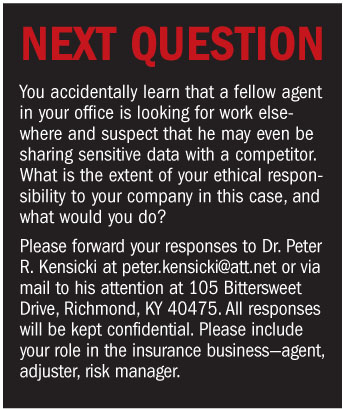One insurance commissioner in the Northeast recently denied an insurer a rate increase that would have anticipated a 3 percent underwriting gain. The commissioner's justification: Given the state of the economy, the insurer should not profit at all.
Naturally, there was no shortage of criticism of the insurance commissioner's actions. Yet the commissioner's personal ethics are not at issue here. Rather, the issue is how insurers and their employees should respond to the decision—on an ethical level.
 Before summarizing their responses, it is noteworthy that so many readers see it necessary to list actions they would believe unethical that should not be considered by insurers or their employees. For example, one former Pennsylvania adjuster writes, "It would be inappropriate to invalidate the decision by not paying or delaying legitimate claims, by artificially decreasing reserves or delaying payments to vendors." A law professor from Kentucky agrees: "The insurer cannot, legally or ethically, deny or delay payment on valid claims."
Before summarizing their responses, it is noteworthy that so many readers see it necessary to list actions they would believe unethical that should not be considered by insurers or their employees. For example, one former Pennsylvania adjuster writes, "It would be inappropriate to invalidate the decision by not paying or delaying legitimate claims, by artificially decreasing reserves or delaying payments to vendors." A law professor from Kentucky agrees: "The insurer cannot, legally or ethically, deny or delay payment on valid claims."
Recommended For You
Want to continue reading?
Become a Free PropertyCasualty360 Digital Reader
Your access to unlimited PropertyCasualty360 content isn’t changing.
Once you are an ALM digital member, you’ll receive:
- Breaking insurance news and analysis, on-site and via our newsletters and custom alerts
- Weekly Insurance Speak podcast featuring exclusive interviews with industry leaders
- Educational webcasts, white papers, and ebooks from industry thought leaders
- Critical converage of the employee benefits and financial advisory markets on our other ALM sites, BenefitsPRO and ThinkAdvisor
Already have an account? Sign In Now
© 2025 ALM Global, LLC, All Rights Reserved. Request academic re-use from www.copyright.com. All other uses, submit a request to [email protected]. For more information visit Asset & Logo Licensing.








